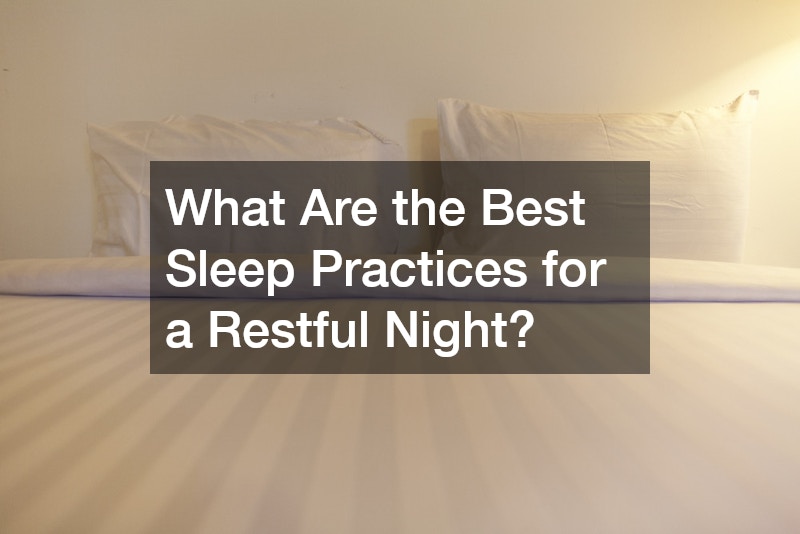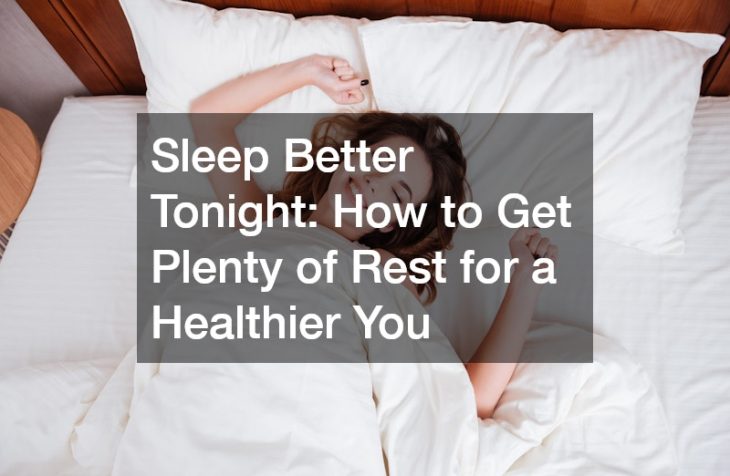Sleep Better Tonight How to Get Plenty of Rest for a Healthier You

The importance of sleep cannot be overstated. Ensuring that you get plenty of rest is crucial for maintaining both physical and mental health. Unfortunately, many people struggle to achieve the quality sleep they need. Poor sleep can negatively impact your immune system, emotional regulation, and overall well-being.
This guide explores ten key aspects of sleep that will help you transform your nightly routine for optimal rest and rejuvenation. By implementing these strategies, you can enhance your sleep quality, boost your health, and wake up feeling refreshed every day.
What Are the Benefits of Getting Plenty of Rest?
When you get plenty of rest, you are giving your body the time it needs to recover, repair, and prepare for the next day. Here’s how sufficient sleep positively impacts your health:
Physical Health Improvements
Lack of sleep is directly linked to several health issues, including heart disease, high blood pressure, and obesity. In contrast, proper rest helps with weight loss by regulating hunger hormones, reducing cravings, and improving metabolism.
Mental Health Enhancements
Sleep is vital for mental clarity and emotional regulation. A well-rested brain is better at handling stress, anxiety, and depression. Those who get plenty of rest are more resilient against mental health disorders.
Increased Productivity and Focus
Your brain consolidates information and improves cognitive function while you sleep. Proper rest allows for better problem-solving skills, memory retention, and focus throughout the day.
Improved Immune System
A strong immune system relies on sleep to function efficiently. Sleep enhances the production of infection-fighting cells, making you less prone to illnesses.
Better Mood and Emotional Regulation
Sleep deprivation often leads to irritability and mood swings. When you get plenty of rest, your emotional regulation improves, reducing the likelihood of stress-related conflicts.
How Much Sleep Do You Really Need Each Night?
Not everyone requires the same amount of sleep, but understanding general guidelines can help you find your ideal duration.

Recommended Sleep Durations by Age
- Infants: 14-17 hours
- School-aged children: 9-11 hours
- Adults: 7-9 hours
- Seniors: 7-8 hours
Understanding Sleep Cycles
Sleep occurs in cycles, including light sleep, deep sleep, and REM sleep. Ensuring that you complete full cycles is crucial for restorative rest.
Identifying Your Personal Sleep Needs
Listening to your body’s signals can help determine the right amount of sleep for you. If you wake up feeling groggy, you may not be getting enough quality sleep.
Effects of Sleep Deprivation
Chronic sleep deprivation can lead to obesity, heart disease, and even cognitive decline. Prioritizing sleep can prevent long-term health complications.
Listening to Your Body’s Signals
If you feel fatigued during the day, it’s a sign you aren’t getting adequate rest. Adjust your bedtime accordingly to ensure you get plenty of rest every night.
Why Can’t I Fall Asleep Easily?
Several factors can disrupt your ability to fall asleep.
Analyzing Sleep Disruptors
Environmental factors, stress, and even your home’s construction—such as drafty windows—can contribute to poor sleep. Choosing the best window manufacturers can help create a quiet, well-insulated sleeping space.
The Role of Stress and Anxiety
Overthinking and stress release cortisol, which keeps you alert and prevents restful sleep. Meditation and mindfulness can help lower stress levels.
Impact of Diet and Caffeine Consumption
Caffeine and sugary foods before bed can make it harder to fall asleep. Reducing intake in the evening is crucial.
The Effect of Electronics and Blue Light
Blue light from screens inhibits melatonin production, making it difficult to feel sleepy. Avoid screens at least an hour before bed.
Creating a Relaxing Bedtime Routine
A calming bedtime routine, including reading or light stretching, can signal your body that it’s time to sleep. Proper air conditioning also ensures a comfortable sleep temperature.
What Are the Best Sleep Practices for a Restful Night?
Following healthy sleep habits can drastically improve your sleep quality.

Establishing a Consistent Sleep Schedule
Going to bed and waking up at the same time every day helps regulate your internal clock.
Creating a Comfortable Sleep Environment
Investing in a home remodel that prioritizes a cozy bedroom setting, such as blackout curtains and ergonomic furniture, can enhance your rest.
Mindfulness and Relaxation Techniques
Practices like deep breathing, progressive muscle relaxation, and guided meditation can prepare your mind for sleep.
Choosing the Right Sleepwear and Bedding
Soft, breathable fabrics help regulate body temperature, reducing sleep disturbances.
Optimizing Room Temperature and Lighting
An optimal sleep environment includes dim lighting and the right temperature, which a reliable air conditioning company can help maintain.
How Do Naps Affect My Nightly Sleep?
Naps can be beneficial or detrimental depending on how they are managed.
Understanding Different Types of Naps
Power naps (10-20 minutes) can refresh you without disrupting nighttime sleep.
The Perfect Nap Duration
Short naps under 30 minutes help prevent grogginess.
Timing Naps for Maximum Benefit
Napping too late in the day can interfere with your ability to get plenty of rest at night.
Avoiding Naps That Disrupt Nighttime Sleep
If you struggle with nighttime sleep, reducing or eliminating naps may help.
Signs That Napping Is Right for You
If you feel exhausted during the day despite a full night’s sleep, a short nap might be necessary.
Is It True That Some Foods Help You Sleep Better?
Certain foods promote relaxation and melatonin production.
Foods Rich in Sleep-Friendly Nutrients
Magnesium-rich foods like almonds and bananas help relax the muscles.
Herbal Teas to Promote Relaxation
Chamomile and valerian root teas can induce drowsiness.
The Role of Tryptophan in Sleep
Turkey, eggs, and nuts contain tryptophan, an amino acid that aids sleep.
Best Practices for Nighttime Snacking
Eating a light snack before bed, rather than a heavy meal, prevents digestive discomfort.
Avoiding Sleep-Inhibiting Foods and Beverages
Avoid spicy foods, alcohol, and high-sugar snacks before bedtime.
Can Exercise Improve Sleep Quality?
Regular exercise promotes deeper sleep.

The Impact of Morning vs. Evening Exercise
Morning exercise boosts energy levels, while evening workouts can either help or hinder sleep depending on intensity.
The Connection Between Fitness and Restfulness
Physical activity reduces stress, making it easier to get plenty of rest.
Exercises That Calm the Mind Before Bed
Gentle yoga and stretching promote relaxation.
What Role Does Mental Health Play in Sleep?
Sleep and mental health are closely connected.
Understanding the Sleep-Depression Cycle
Poor sleep can worsen depression, creating a vicious cycle.
How Anxiety Affects Rest
Overthinking at night can keep you awake longer.
The Benefits of Cognitive Behavioral Therapy for Insomnia (CBT-I)
CBT-I helps reframe negative thoughts that interfere with sleep.
Integrating Meditation and Mindfulness
Breathing exercises and breathable tape for mouth breathing can improve sleep quality.
Seeking Professional Help for Sleep Issues
A dentist can assess if oral health issues like teeth grinding impact your sleep.
How Can I Track My Sleep Effectively?
Understanding and tracking your sleep patterns can help you identify issues and make necessary adjustments for better rest. Whether through traditional methods like sleep journals or advanced wearable technology, monitoring your sleep can provide valuable insights into how well you’re actually resting each night. By applying this information, you can make meaningful changes that improve your sleep quality and ensure you get plenty of rest consistently.

Using Sleep Journals to Identify Patterns
A simple but effective way to monitor sleep is by keeping a sleep journal. Each morning, write down details about the previous night, including what time you went to bed, how long it took to fall asleep, how many times you woke up, and how rested you felt upon waking. Over time, patterns will emerge that can reveal potential sleep disruptors. If you notice recurring issues such as waking up at odd hours or feeling groggy despite getting enough sleep, adjustments to your routine may be necessary.
The Advantages of Wearable Sleep Trackers
Modern technology has made tracking sleep easier than ever. Wearable devices, such as smartwatches and fitness trackers, monitor various sleep metrics, including total sleep duration, sleep cycles, heart rate, and movement throughout the night. These devices can help pinpoint disruptions in your sleep, such as frequent awakenings or an imbalance in deep versus light sleep. Some even provide personalized sleep scores and suggestions on how to improve sleep hygiene. If you frequently feel tired despite what appears to be a full night of sleep, using a tracker could help determine if you suffer from sleep apnea or another underlying condition.
Understanding Sleep Data and Metrics
Analyzing sleep data from wearable devices or sleep apps can be overwhelming at first, but understanding the key metrics can make a difference in how well you get plenty of rest each night. Sleep trackers provide details on:
- Total Sleep Time: How long you actually sleep, not just time spent in bed.
- Sleep Efficiency: The percentage of time spent asleep while in bed.
- Sleep Stages: The breakdown of deep sleep, REM sleep, and light sleep.
- Restlessness and Awakenings: How frequently you move or wake up during the night.
If your data consistently shows poor sleep efficiency or insufficient deep sleep, it may indicate an issue that requires further investigation, such as an improper sleep environment, stress, or an undiagnosed condition. Consulting a dentist can also be beneficial, as dental issues like teeth grinding may contribute to poor sleep quality.
Applying Sleep Insights for Improvement
Once you have gathered enough sleep data, it’s essential to apply those insights to make real changes. If you find that you wake up frequently, consider whether factors like room temperature, light exposure, or even noise are playing a role. Investing in a high-quality air conditioning company can ensure your bedroom remains at an ideal sleep temperature, promoting deeper, uninterrupted sleep.
For individuals who notice patterns of disrupted sleep cycles or chronic fatigue, lifestyle adjustments such as modifying caffeine intake, adjusting bedtime routines, and exploring relaxation techniques can help. Those who frequently suffer from sleep apnea may need professional treatment, such as CPAP therapy, positional therapy, or even surgical interventions like plastic surgery to address airway blockages.
Balancing Data with Personal Experience
While sleep tracking technology and data-driven insights are beneficial, it’s important not to rely solely on numbers. Your personal experience matters just as much as sleep metrics. If your tracker says you had a “good” sleep but you still feel exhausted, something deeper may be at play. In some cases, treatments such as facial botox may be recommended for individuals who experience tension headaches or jaw clenching that disrupts sleep.
Ultimately, tracking your sleep allows you to take control of your nightly rest. By making informed adjustments, listening to your body, and seeking professional advice when necessary, you can ensure that you consistently get plenty of rest, improving your overall health and well-being.
What Should I Do If I Suspect a Sleep Disorder?
Recognizing Common Sleep Disorders
If you suffer from sleep apnea, seeking medical advice is crucial.
Consulting with a Sleep Specialist
If you consistently struggle with poor sleep, experience excessive daytime fatigue, or wake up feeling unrefreshed despite spending enough time in bed, consulting with a sleep specialist may be necessary. A sleep specialist is a doctor trained in diagnosing and treating sleep disorders, including insomnia, restless leg syndrome, and conditions like suffer from sleep apnea. These professionals can help pinpoint the root cause of your sleep disturbances through detailed assessments, lifestyle evaluations, and, if necessary, medical testing.
During your consultation, the specialist will ask about your sleep habits, overall health, and any symptoms you experience, such as snoring, frequent awakenings, or trouble staying asleep. They may also review your use of medications, dietary habits, and stress levels to determine if external factors are impacting your ability to get plenty of rest. If necessary, they might recommend additional evaluations, such as a sleep study, to gain further insight into your sleep patterns.
Exploring Diagnostic Sleep Studies
A diagnostic sleep study, also known as polysomnography, is a comprehensive overnight test that monitors various physiological functions while you sleep. These studies are typically conducted in a specialized sleep center, but in some cases, a home-based test may be available. A sleep study tracks brain activity, eye movement, heart rate, breathing patterns, oxygen levels, and muscle activity to identify potential sleep disorders.
If you suffer from sleep apnea, a sleep study can determine the severity of the condition by monitoring how often your breathing is interrupted throughout the night. Other sleep issues, such as periodic limb movement disorder or narcolepsy, can also be diagnosed through these tests. The results of a sleep study provide critical data that allows your sleep specialist to recommend an effective treatment plan tailored to your needs.
Treatment Options for Sleep Disorders
Once a sleep disorder has been diagnosed, the appropriate treatment plan can be developed to help restore healthy sleep patterns. Treatment options vary depending on the condition but may include lifestyle changes, medical interventions, or therapy.
For individuals diagnosed with suffer from sleep apnea, continuous positive airway pressure (CPAP) therapy is often the most effective solution. A CPAP machine delivers a steady stream of air to keep the airways open, preventing interruptions in breathing. In some cases, alternative treatments like oral appliances from a dentist or surgical interventions such as plastic surgery to remove obstructions in the airway may be recommended.
Regardless of the specific sleep disorder, seeking treatment can significantly enhance your quality of life. By addressing the root cause and implementing an appropriate solution, you can ensure that you get plenty of rest and wake up each day feeling fully refreshed and energized.
Treatments like facial botox for jaw tension may improve sleep for those with teeth grinding issues.
Managing Sleep Disorders for Better Well-Being
By prioritizing these sleep strategies, you can ensure that you get plenty of rest every night. The benefits of quality sleep extend far beyond just feeling well-rested in the morning; they enhance your overall well-being, boost productivity, and contribute to long-term physical and mental health. Developing a consistent sleep routine, optimizing your sleep environment, and paying attention to lifestyle habits can transform the way you sleep and, ultimately, how you feel throughout the day.
If you’ve been struggling with restless nights, now is the time to take action. Whether it’s adjusting your diet, reducing screen time before bed, or seeking professional help for sleep disorders, every small step brings you closer to achieving restorative sleep. Remember, sleep is not a luxury—it’s a necessity for a thriving, energetic, and fulfilling life.
Make these changes tonight to get plenty of rest and wake up feeling revitalized each morning. By embracing better sleep habits, you’ll not only improve your nights but also create better days, leading to a healthier, happier you.
